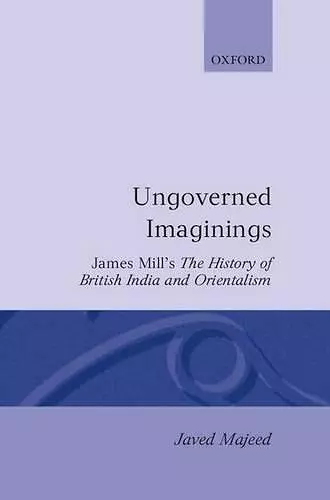Ungoverned Imaginings
James Mill's The History of British India and Orientalism
Format:Hardback
Publisher:Oxford University Press
Published:28th May '92
Currently unavailable, and unfortunately no date known when it will be back

Drawing on contemporary critical work on colonialism and the cross-cultural encounter, this is a study of the emergence of Utilitarianism as a new political language in Britain in the late-eighteenth and early-nineteenth centuries, and focuses on the relationship between this language and the complexities of British Imperial experience in India at the time. Examining the work of Mill and Sir William Jones, and also that of the poets Robert Southey and Thomas Moore, Javed Majeed highlights the role played by aesthetic and linguistic attitudes in the formulation of British views on India, and reveals how closely these attitudes were linked to the definition of cultural identities. To this end, Mill's utilitarian study of India is shown to function both as an attack on the conservative orientalism of the period, and as part of a larger critique of British society itself. In so doing, Majeed demonstrates how complex British attitudes to India were in the late eighteenth and early nineteenth centuries and how this might be explained in the light of domestic and imperial contexts.
`accomplishes the important task of contextualizing The History of British India in light of the arguments about culture, writing, history, and philosophy that were part of Orientalist writing in the nineteenth century in England. ... his book Ungoverned Imaginings adds substantially to an understanding of the philosophical debates in nineteenth-century England and their impact on texts that became important in colonial contexts.' Journal of Asian Studies, November 1993
an elegant and persuasive book * Bulletin of the School of Oriental and African Studies *
`Majeed's account of James Mill is carefully nuanced and ultimately not unsympathetic to him ... Majeed's study with its interesting hypotheses about the interpretation of Mill's History is a very welcome sign of the increasing sophistication being applied to the treatment of what have often been dismissed as "orientalist texts"' The Journal of Imperial and Commonwealth History
`Not the least of the achievements of Javed Majeed's study of James Mill is the awareness of similar intricacies of relationship between colonised countries and their political representations.' Judy Newman, Times Higher Education Supplement
'Majeed's study with its interesting hypothosis about the interpretation of Mill's History is a very welcome sign of the increasing sophistication being applied to the treatment of what have often been dismissed as 'orientalist texts'.' P.J. Marshall, King's College, London, The Journal of Imperial and Commonwealth History, May 1993
'an important study of romantic orientalism and its critics ... Like much recent criticism in this field Majeed's excellent book takes to task both the epistemology of Said's Orientalism as well as his account of the relationship between literature and imperialism in early nineteenth-century European (here specifically British) culture ...Javed Majeed has told us a lot we didn't know about Mill and romantic orientalism.' Nigel Leask, History Workshop Journal
'Javed Majeed has written a very difficult book whose argument, however, is well worth the effort of following. The author provides an important reading of an enlightenment mind functioning in the age of romantic sensibilities. In that regard this volume begins to open a new dimension to the intellectual world in which James Mill and his utilitarian generation functioned.' Frank M. Turner, Yale University, Albion, Summer 1993, Vol. 25, No. 2
'A fresh look at James Mill and the idiom of utilitarianism that is also a wide-ranging intellectual history of his era.' Brian A. Hatcher, Illinois Wesleyan University, Religious Studies Review, Volume 19, Number 4 / October 1993
'This is an important book. It challenges in convincing fashion the attempt by colonial discourse theory to reduce the European scholarly encounter with India to little more than intellectual domination in the service of empire ... this book is essential reading for everyone interested in the European intellectual encounter with the Orient during the age of empire.' Lynn Zastoupil, Rhodes College, The International History Review, XV:3: August 1993
'a thought-provoking study of the importance of India for the development of James Mill's utilitarianism ... this is an important book ... It is well-argued, clearly written and deserves a wider readership than will be attracted by the somewhat restrictive title ... we are in Majeed's debt. This is a stimulating study which adds considerably to debates about Mill and depictions of the Orient by the west.' Penelope Carson, Denstone College, Utilitas
ISBN: 9780198117865
Dimensions: 224mm x 143mm x 19mm
Weight: 397g
234 pages